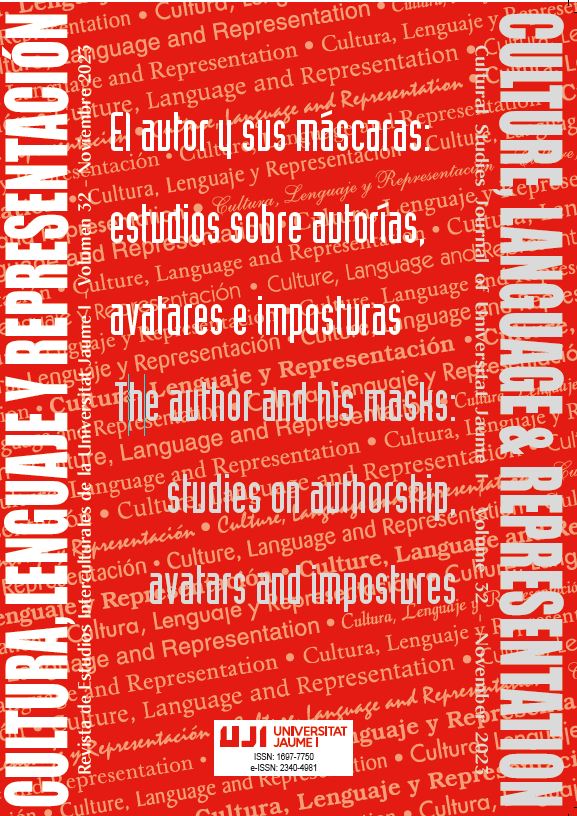The «brand identity» of the Spanish Mircea Cărtărescu
Main Article Content
Abstract
Like all authors, the romanian Mircea Cărtărescu creates his own ethos, not only in his original literary field, but in all the fields to which his work is translated. Unlike the «brand identity» of any other commercial product, the figure of the writer is a flexible and dynamic construction ―within its reiteration―, which is adapting to a «previous ethos» in constant evolution, according to the increase or loss of symbolic and social capital. Self-image is often communicated through implicit or explicit «career narratives», in which the literary author reacts to a «brand image», perceived as unsatisfactory or defective. This study attempts to highlight both significant nodes in the network of Cărtărescu’s ethos and the rhetorical resources used to communicate them. For this purpose, the «career narratives» expressed during two face-to-face paratextual activities, held on Spanish soil were analysed: the first, when the author in question was still an emerging writer in Spain, and the second, right after the remarkable success of his novel Solenoid.
Downloads
Article Details
An open-access CREATIVE COMMONS copyright license is used. Those authors whose works are published by this journal, accept the following terms:
- Authors will retain their copyright and guarantee the Journal the right to first publish their work, which will simultaneously be subject to the Creative Commons Recognition License CC BY SA that allows third parties to share the work, provided that its author and first publication is indicated.
- Authors may adopt other non-exclusive license agreements for the distribution of the published version of the work (e.g., deposit it in an institutional telematics file or publish it in a monographic volume) provided that the initial publication in this journal is indicated.
- Authors are allowed and recommended to disseminate their work over the Internet (e.g. in institutional telematics files or on their website) before and during the submission process, which can produce interesting exchanges and increase quotes of the published work.
Funding data
-
Ministerio de Ciencia e Innovación
Grant numbers PID2019-104215GB-I00
References
Amossy, Ruth. 2015. La présentation du soi. Paris: Presses Universitaires de France.
Anholt, Simon. 2007. Competitive Identity. The New Brand Management for Nations, Cities and Regions. Hampshire y Nueva York: Palgrave McMillan.
Beristáin, Helena. 1995. Diccionario de retórica y poética. México, D. F.: Porrúa.
Boltanski, Luc y Laurent Thévenot. 2006. On Justification. The Economies of Worth. Princeton: Princeton University Press.
Cărtărescu, Mircea. 2018. «El lápiz de carpintero». En Carnets de Formentor, 9: 59-71.
Cărtărescu, Mircea. 2011. Zen. București: Humanitas.
Casanova, Pascale. 2001. La República Mundial de las Letras. Barcelona: Anagrama.
Dix, Hywel. 2017. The Late-Career Novelist. Career Construction Theory, Authors and Autofiction. London: Bloomsbury Academic.
EdImpedimenta (canal de YouTube). 2013. «Encuentro en Librería Alberti con Mircea Cartarescu», vídeo publicado el 13.03.2013. https://www.youtube.com/watch?v=mwvJ8IopHvU&t=1084s.
Heinich, Nathalie. 2000. Être écrivain. Paris: Éditions La Découverte & Syros.
Iacob, Mihai. 2022. «Sobre la (re)construcción editorial de Mircea Cărtărescu en España». HELIX. Dossiers zur romanischen literaturwissenschaft (en prensa).
Iacob, Mihai. 2021. «El ethos federado de Mircea Cărtărescu en la literatura española (2010-2018)». Siglo XXI. Literatura y Cultura Españolas, 19: 153-175.
Iacob, Mihai. 2018. «De la tricoul cu mandală la camașa cu mânecă scurtă sau negocierea imaginii scriitorului tradus: două lecturi publice ale lui Mircea Cărtărescu în Spania». En Teritorii, granițe, comunități, ed. Costin Popescu. București: Editura Universității din București.
Jameson, Fredric. 1986. «Third-World Literature in the Era of Multinational Capitalism». Social Text, 15: 1986, pp. 65-88. http://www.jstor.org/stable/466493.
Janssen, Susanne. 1998. «Side-roads to success: The effect of sideline activities on the status of writers». Poetics, 5: 265-280.
Mainguenau, Dominique. 2007. Discursul literar. Iași: Institutul European.
Meizoz, Jérȏme. 2020. Faire l’auteur en régime néo-liberal. Rudiments de marketing littéraire. Ginebra: Slatkine.
Moran, Joe. 2000. Star Authors. Literary Celebrity in America. London, Sterling, Virginia: Pluto Press.
Perelman, Chaïm y Lucie Olbrechts-Tyteca. 1989. Tratado de Argumentación. La Nueva Retórica. Madrid: Gredos.
Terian, Andrei. 2022. «The Poetics of the Hypercycle in Mircea Cărtărescu´s Solenoid». Life Writing, 19: 1-18. https://doi.org/10.1080/14484528.2020.1747351
Thomson, Matthew. 2006. «Human Brands: Investigating Antecendents to Consumers’ Strong Attachments to Celebrities». Journal of Marketing, 3: 104-119.
Zafiu, Rodica. 2000. Narațiune și poezie. București: BIC ALL.


